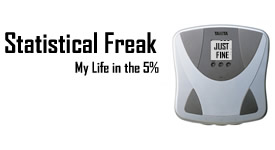Q: Do you think there is such a thing as a healthy weight?
A: No
The End. Thank you.
Oh, wait - this is supposed to be a blog post. I will elaborate.
When I picked this topic last week, my answer to that question was going to be “yes”. Then, over the course of the week, as I pondered the things I was going to say about it, it wavered to a “maybe”. Then, as the thinking continued, I had to completely reverse my original answer, and go with the “No” that you see above.
And all of this was based not on research or reading, but just thinking about my own personal experience with health and weight.
I had a number of things that was going to say about “healthy weight” when my answer to the question was going to be yes. What I’d like to do here is start with my original points… and then walk through the thinking that caused me to change my yes to a no.
Original Thesis:
Each individual person has a weight range at which they are “healthy”. This is not the same weight range for each person, but for each person there is a weight - both low and high - which becomes “unhealthy”.
New Thesis:
If a person is “healthy” - i.e. - cholesterol, blood pressure, liver enzymes, what have you are in line with the “not imminently dying”, then their weight, whatever it is, is, by default - healthy.
Original Argument:
I have existed in my life along a large range of weights. When I was at my highest weight (275), I had a number of what are referred to as “Weight related” health problems. High cholesterol. High blood pressure. Knee pain.
I went on a crazy-ass crash diet. When I hit about 190 is when the “weight related issues” were pretty much resolved.
I continued to lose weight, and have gotten down as low as 130. At that weight, I had some other health issues… dizziness, fatigue, temperature control… that I also considered “weight related”.
Originally, from this, I decided that my “Healthy Weight Range” must be 140 to 190… because that is the weight that corresponded with no health issues.
Rebuttal to Original Argument:
When I considered my situation, though… I started thinking through the particulars, and most especially, was thinking about the whole correlation / causation argument.
What if it’s not the “weight” at all that fixed these health issues?
High Cholesterol… OK, yes. Prior to my “diet”, pretty much everything I ever ate was covered with a thick layer of gooey melted cheese. (tasty, tasty, cheese).
I don’t think anyone can pretend that eating THAT much cheese is healthy for a body (seriously, it was A LOT OF CHEESE).
So I go on this diet, and I lose weight. And my cholesterol is now healthy. But - is it because I lost weight? Or is it because I stopped bathing in melted cheese every day? I strongly suspect that if I had merely cut out the ridiculous amount of cholesterol I was eating, it might have had the same effect on my cholesterol… and while a reduction in my cheese habit might have also lead to some accompanying weight loss, it certainly wouldn’t have been at the level that I lost due to the aforementioned crazy ass diet.
High Blood Pressure - yes - when I was at a high weight, I had high blood pressure. When I hit about 190, I no longer had high blood pressure. Hmm - appears to be “weight related”… But the thing is… as part of my diet, I was exercising. This is not something I had ever done before. Exercising makes your heart strong, improves cardio efficiency… lowers blood pressure? So… I can’t really say that it wouldn’t have been perfectly possible to institute an exercise regimen that, while, again, might have resulted in some weight loss as a side effect, couldn’t have lowered the BP without significant weight loss.
Knee pain - again… seems so simple… yes - your knees hurt because you were “too heavy” for them. But the exercise thing holds here too… is it not possible that by exercising, I strengthened my knee joints and so they were able to bear me up without pain? If I had kept exercising, might I have been able to easily carry a heavier body weight without issue?
So all of these “health issues” that I previously thought I solved by being at a “healthy weight” might easily have occurred at a higher weight than they did… it’s just that I was losing weight at such a rapid clip, 190 is where the “healthy” was noticed.
It’s entirely possible that I could have made all these changes to my “health” and seen only a small weight loss - my “healthy weight” could be 225… 250? I have no idea, because I never gave it a chance. But I can’t claim that the weight I am now is the only one that could be “healthy”.
Correlation vs. Causation:
I think the fact that instituting an exercise program and eating good, nutritious foods can BOTH bring about health benefits AND sometimes result in loss of weight has really gotten people confused.
It’s led the world to deduce that weight loss is the things causing the health, not the steps that may have brought about both the state of health and weight.
Which is why (and yes, I know I am preaching to the choir here), these debates about public health ought to actually FOCUS ON HEALTH!!!
Because - get this - I am a healthy person now, at 141 pounds… and one day, when I can no longer participate in full contact roller derby, and I am exercising a little less, and I gain weight as a result… well, I’ll still be exercising some and eating good food - so, hey! I’ll also be healthy at THAT weight, whatever it ends up being.
Healthy is healthy… if weight is high, and there are no other issues, weight alone cannot make a person “unhealthy”. Nor, if weight is low, but all the “numbers” are in “you’re gonna die” territory, does that low weight magically make the person “healthy”.























I have a rail thin friend who exsists on french fries, cigarettes and copious amounts of alcohol.
I strongly suspect she might expire before those of us who partake of the Bloomin Onion at Outback Steakhouse.
Seriously though. I gave this post a LOT of thought because I never really wondered about a healthy weight range for myself. Mostly because I’ve been so preoccupied with running around and taking care of kids. Honestly, I kind of come last on the list.
My knees are shot but that’s mostly damage from years of being an avid runner (I ran at my lowest and highest weights and found no difference in my endurance).
Thank you for this. I was trying to explain just this to a friend the other night but he just couldn’t see where I was coming from.
My sister is tall (six foot 1 i belive) and skinny for that size (between 8 and a 12, depending on designer) She, at one point, existed soley on bacon and cheese. She eats HORRIBLY and drink as much as any aging hipster should. I think she actually spent her entire paycheck at work once (she works in a liquor store) She eats almost no hommade foods, exisiting off fast food from her urban core wasteland (she lives in the trendy “midtown” area while i am a suburban mom)
YOu cant tell me she is as healthy as i am….i cook 5-6 times a week for me and my kids….i spend at least 30 a week at the farmers market and i dont throw veggies away so they must be going SOMEWHERE….if its not me and my equally as fat boyfriend/husband (we both are over 300 lb and TALL) then my kids are eating like 10 lbs of fresh fruits and veggies weekly.
….and thank you ADD
I’ve always thought a “healthy” weight was whatever weight one felt one’s best at, whether their numbers were in the “healthy” range or not (especially since those ranges keep getting lowered every so often).
My numbers are all in the healthy range, but I have mobility issues which have been getting worse over the last 12 years (ever since I had my WLS that failed). I consider myself healthy, even though I have arthritis and fibromyalgia. I don’t take a lot of medications for them - SynVisc shots twice a year for my knees, and Cymbalta/relafen for the fibromyalgia (oh, and topamax for my migraine headaches).
There are days when DH and I eat healthy meals, and there are a few days when we don’t eat so healthily (not often, he has type 2 diabetes, and we do a lot of carb-counting to keep his blood gluc0se under control). But if it weren’t for his diabetes, neither of us would consider it a moral imperative to adhere to anyone’s guidelines for what is considered a “healthy” lifestyle. The only reason we do it now is because we want him to live a long life, and have the best quality of life that he can in that time.
‘If a person is “healthy” – i.e. – cholesterol, blood pressure, liver enzymes, what have you are in line with the “not imminently dying”, then their weight, whatever it is, is, by default – healthy.’
Agreed. Altough when I read the title of your post, my initial response was: “Yes, there is.” And let me elaborate on that thought, because it went on: “If you’re healthy, you’re at a healthy weight.”
Indeed. It will go a long way if we can convince the rest of the country that focusing on Health and focusing on Weight are not the same things. But that’s a long-ass road we’ve got to travel and we’re only stepping out of the gate.
Because, as you said, changing your lifestyle can result in improved health and lost weight. But people don’t actually see your lifestyle changes… they do, however, see your lost weight. And if you say, “I feel much better” it’s easier to tie those two together.
Nice self-debate.
Peace,
Shannon
I absolutely agree that the idea that there is one weight (or even a small range of weights) that can predict health is silly. And I’m also of the belief that if someone is sedentary and has a poor (as in very nutrient poor or makes them feel physically not good) diet, then increasing their daily movement and improving their diet will have a huge impact on their health. It’s one of the big problems I have with a lot of the political talk around programs designed to curb/prevent obesity - when we make weight the ultimate signal of health, we’re not catching all the problems that can come from a sedentary lifestyle and/or ‘bad’ diet.
I bet you can guess there’s a big but comin’…
But my own personal experience was that HAES had a limit in terms of improving my health. And for me that makes a certain amount of sense because I carry most of my weight in my abdomen and have/had many of the problems associated with carrying a lot of visceral fat. And while vigorous exercise can improve some of the insulin resistance associated with this type of fat, I found it very exhausting at my highest weight to do vigorous exercise - to the point that I would need a few hours to be able to do anything else.
Oh, I want to ramble on some more, but it’s time for class.
Attrice,
Are you saying that HAES is not completely appropriate for people with larger amounts of visceral fat or for people with insulin resistance? If it’s the latter, then I think Dr. Bacon would agree that you need to go on a diet appropriate for insulin resistance. If it’s the former, then I would ask why not? And also, what would you recommend for them? The same insulin resistance diet?
Just curious.
Peace,
Shannon
Neither. What’s appropriate for someone is going to vary from person to person. My only point was that fat in and of itself - not just inactivity or ‘poor’ diet - can be behind some health issues.
If someone is in a similar situation to me where they’re active and eating well and still don’t have the kind of healthy outcomes they’d like, I don’t believe losing weight is their only option. Like you said, if you are IR, then you can have a diet that controls that without it being a weight loss diet. In my case, I was prescribed birth control for my amenorrhea and glucophage for blood sugar issues, but I didn’t like the side-effects.
The only point I would make about the HAES approach to something like insulin resistance is that it’s not necessarily easier for everyone to be on a diet that restricts certain foods and requires vigilance in terms of macronutrients than to restrict calories. AFAIK, long-term adherence to any lifestyle change isn’t great so neither approach is a guarantee in terms of improved health over the long haul.
I think the point that HEALTH is also not a moral imperative is an important one. I choose to live my life in ways that I consider optimal for my health. HOWEVER… nothing says anyone else is obliged to do this. People have every right in the world to be sedentary and eat any kind of non-nutritious food that they want to. Or to smoke, or drink alcohol. Health is a personal decision and everyone’s own personal business.
The judge-y mcjudgersons of the world need to just mind their own business as long as my health or lack thereof isn’t hurting them.
AND OMG - DO NOT TALK TO ME ABOUT INSURANCE!!! You know who NEVER GOES TO THE DOCTOR!? People who don’t care about their health! They aren’t USING the system. (yes, yes, I know, it’s an oversimplification, but it’s Friday, I can oversimplify all I want.)